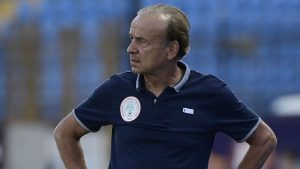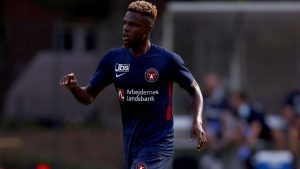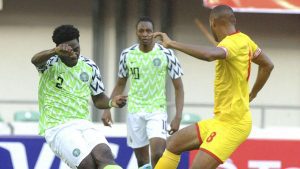
Ahead of Tuesday’s friendly against the Carthage Eagles, the German coach faces a number of selection headaches, especially in Nigeria’s midfield
Gernot Rohr’s reaction to Friday’s defeat at the hands of Algeria in Klagenfurt was to focus on the positives.
As well he might. It was hardly a performance to warm the cockles, and Super Eagles fans who had tuned in hoping for some cheer in the midst of the prevalent social agitation in Nigeria were left disappointed.
On an individual level, there were some fine performances, to be fair.
Maduka Okoye, making only his second international appearance, looked reasonably assured; Zaidu Sanusi marked his debut with an effervescent display; Alex Iwobi, although less effective after the break, knitted the play together very well in the opening period; Leon Balogun, in from the start for the first time since the Africa Cup of Nations defeat by Madagascar, was the picture of composure and class in the heart of the defence; and Tyronne Ebuehi reminded everyone why Benfica swooped for him two years ago, before the injuries kicked in. That was less than half the team on Friday, however.
Over the other six, there were doubts and concerns of sundry kinds, and not all of their own making. However, it does bear remarking upon, and their respective failures will no doubt play a part in Rohr’s thinking regarding the selection against Tunisia.

The German will be aware it simply will not do to close the international window with another defeat, as that risks poisoning the well ahead of November’s double-header against Sierra Leone. To leave on such a sour note, after an almost year-long enforced hiatus, would be counterproductive; yet, there remain a number of options within the squad that could do with a run-out.
Finding the balance between competitiveness and giving a fair shake to everyone is the real challenge for Tuesday.
It is also not as easy as chucking out everyone that underperformed against Algeria.
A combination of injuries and puzzling obduracy has robbed Rohr of options in midfield, meaning it is likely one of Semi Ajayi or Frank Onyeka will get another shot from the start. The former is, of course, not a midfielder – at least not one of international standard – and while he did little wrong on Friday, he also managed to look completely out of his depth as the game reached warp speed.
His failing is, therefore, easier to diagnose than Onyeka’s, although in fairness to the Midtjylland man, being saddled with an abstruse, ill-defined role did him few favours. He, most of all, is deserving of a second look, preferably one granting him the opportunity to show his best qualities anchoring the midfield.

This raises the thorny question of who constitutes the midfield alongside him, especially with a paucity of options on the bench. Mikel Agu’s vignette of ineptitude did little to endear him to the viewing public, and no objective analysis would suggest he showed enough to get another runout. He may very well get a spot, however, purely on the basis of availability.
Unless Rohr gets creative.
This would entail a curveball that very few in football have previously seen, but which could provide a pleasant surprise: Ola Aina in midfield.
The former Chelsea has made his name in the senior ranks as a full-back, but learned the basics of playing in the middle of the park as part of his education in the Chelsea youth system, and indeed played there occasionally.
His technique in possession and composure have been visible in patches – witness his audacious backheel assist for Odion Ighalo at the Afcon, or his slaloming cross-field run in the lead-up to Nigeria’s opening goal against Ukraine in September last year, and as it appears Rohr is partial to blooding Kevin Akpoguma, even the to the point of fielding him at right-back, this may be the best use of Aina’s talents.
Playing him in midfield alongside Onyeka would be highly experimental, but is that not the point of friendlies?

While the midfield composition suffers from a lack of options, the centre-forward position surely has enough to make it so that Paul Onuachu drops to the bench, and from there out of the national team picture.
The Genk man stuck out like a sore thumb on Friday, and was arguably left on too long before eventually making way for Kelechi Iheanacho.
It is hard not to feel some sympathy for Onuachu, who is without a doubt an asset within a system tailored to play to his strengths. Instead, the Super Eagles have a plethora of wingers who favour cutting in on their stronger foot to shoot at goal over crossing to the 2m-tall striker, and even when Sanusi advanced from left-back to whip in a teasing delivery in the first half, the 26-year-old lacked the agility to get on the end of it.
Selecting him dictates a total rethink of a system that has been built painstakingly, and it was apparent even his teammates were unsure quite how to play with and to him.
In his stead, it would be worth seeing exactly what clubmate Cyriel Dessers is all about, and while reconstituting the frontline, Samuel Kalu’s wastefulness could (and probably should) see Moses Simon or Chidera Ejuke get the nod over him.
Rave reviews in training for goalkeeper Matthew Yakubu whets the appetite, and even though he will probably be protected by the captain’s armband, William Ekong’s uncertain showing against Algeria would ideally see him relieved if Balogun wasn’t just returning from injury.


Leave a Reply